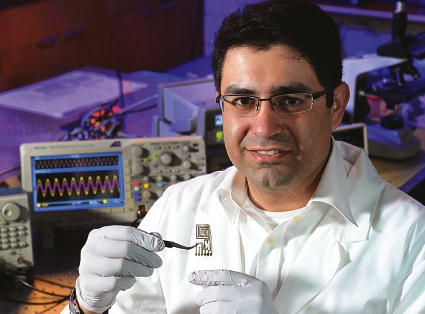A team of mechanical and materials engineers in Iowa State University say that they have a new way of looking at electronics—as impermanent materials that can completely dissolve once they are no longer needed.

“You don’t expect your cell phone to dissolve someday, right?” said Reza Montazami, an Iowa State University assistant professor of mechanical engineering. “The resistors, capacitors, and electronics, you don’t expect everything to dissolve in such a manner that there’s no trace of it.” But, he thinks it can be done and is developing the necessary materials for that example, as well as implantable medical devices, and even military devices.
Montazami says the technology called “transient materials” or “transient electronics” consist of special polymers designed to quickly and completely melt away when a trigger is activated. The research team he’s leading, for example, is developing degradable polymer composite materials that are suitable platforms for electronic components. The team has also built and tested a degradable antenna capable of data transmission. (See Figure 1)
The researchers have already developed and tested transient resistors and capacitors. They’re now working on transient LED and transistor technology, for which they see great potential for commercial applications. Their research on the precise control of the degradation rate of polymer composite materials has been published online in the journal, Advanced Functional Materials.
Just think, Montazami said, if you lose your credit card, you could send out a signal that causes the card to self-destruct. Or, sensors programmed to degrade over certain times and temperatures could be stored with food. When the sensors degrade and stop sending a signal, that food is no longer fresh. Or, when soldiers are wounded, their electronic devices could be remotely triggered to melt away, securing sensitive military information.



